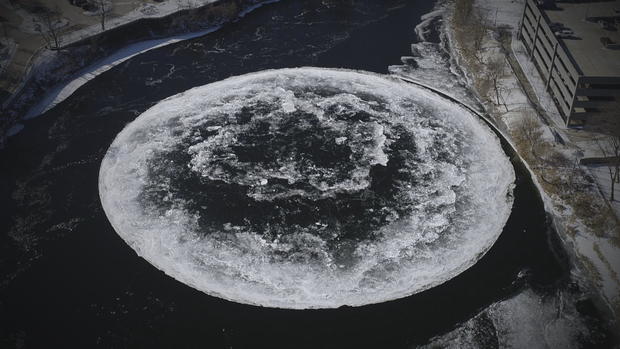Giant ice disk: 300-foot frozen spectacle forms in Maine river
The frigid cold temperatures hitting the Northeast this week have already created a frozen spectacle in Maine where a giant disk of ice in a river near Portland is drawing international attention. The icy wonder was spotted Monday morning by a nearby property owner who notified the city immediately.
Crowds have been lining the Presumpscot River in Westbrook, Maine, over the past few days to see the natural phenomenon in person. One family who was there well after dark Wednesday night said it offered an exciting diversion in the middle of a busy winter week. While the disk does appear to have stopped rotating, visitors just want to catch a glimpse before it all disappears.
"Westbrook is now famous for this spinning ice disk in the river, which is great!" one woman said.
A whopping 300 feet wide, the frozen disk had been slowly spinning on the Presumpscot River for at least three days.
"I was just speaking to my sister in England … I said 'We've made national news.' And she texted me back and she said, 'No, you haven't made national, you've made international. You were just on the BBC!" Maine resident Deborah Lorendo said.
Eric Fisher, chief meteorologist for CBS Boston station WBZ-TV, said the rotation of the ice can be driven by the current of the river and also by temperature changes in the water underneath the ice, creating a vortex that causes it to spin.
"The shore in this case acts as almost like a grinding wheel where the ice hits the coast and it starts to shave off. And it creates this perfect pizza shape of the ice disk there floating in the water," Fisher said.
Steven Daly specializes in river ice hydraulics for the Army Corps of Engineers. He said while ice disks are not unheard of, the ones he's seen are much smaller, ranging from 30 to 50 feet.
"They're very rare. We may hear about these once or twice a winter," Daly said. "They had the perfect combination of air temperature, ice production and flow conditions for this to form … and it may not happen again for a number of years."
Now that it's touching the river bank, it's unclear if this ice disk will once again begin spinning. The approaching winter storms will also likely bury it in snow.
Daly said the thickness of ice disks can vary and advises that no one should walk on them, but rather study them from a safe distance onshore.




